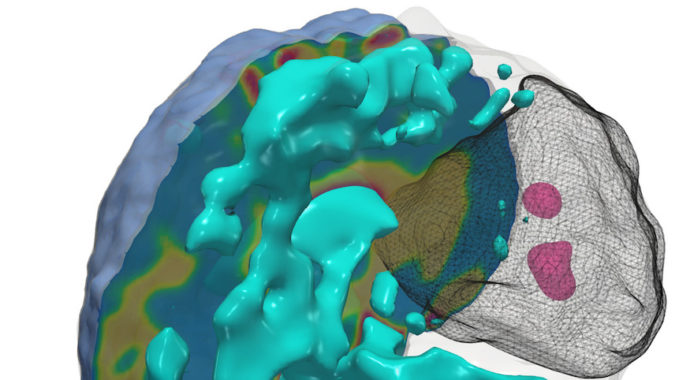


Rise of NIH’s Biowulf Mirrors the Rise of Computational Biology
The story of NIH’s supercomputer Biowulf is fascinating, important, and in many ways representative of the transformation of life sciences and biomedical research into a hybrid discipline that …

HPC in Life Sciences Part 2: Penetrating AI’s Hype and the Cloud’s Haze
Weary of the constant din of AI hype. So is Ari Berman, vice president and general manager of consulting services for BioTeam, a research computing consultancy specializing in life sciences. “E …

Google is First Partner in NIH’s STRIDES Effort to Speed Discovery in the Cloud
July 31, 2018
The National Institutes of Health, with the help of Google, last week launched STRIDES - Science and Technology Research Infrastructure for Discovery, Experimen Read more…

Pattern Computer – Startup Claims Breakthrough in ‘Pattern Discovery’ Technology
May 23, 2018
If it weren’t for the heavy-hitter technology team behind start-up Pattern Computer, which emerged from stealth today in a live-streamed event from San Franci Read more…

Allen Institute Releases AI-based Model of Human Cell
May 14, 2018
Productive use of AI in bioresearch, still in its early stages, took a step forward last week with the release the Allen Integrated Cell – a predictive 3D mod Read more…

Google I/O 2018: AI Everywhere; TPU 3.0 Delivers 100+ Petaflops but Requires Liquid Cooling
May 9, 2018
All things AI dominated discussion at yesterday’s opening of Google’s I/O 2018 developers meeting covering much of Google's near-term product roadmap. The e Read more…

D-Wave Launches Machine Learning Services Business
May 8, 2018
Quantum computing pioneer D-Wave Systems today announced a new business unit – Quadrant – to provide machine learning services based on lessons from its qua Read more…

Part One: Deep Dive into 2018 Trends in Life Sciences HPC
March 1, 2018
Life sciences is an interesting lens through which to see HPC. It is perhaps not an obvious choice, given life sciences’ relative newness as a heavy user of H Read more…

TGAC Unleashes DRAGEN to Accelerate Genomics Workflows
October 28, 2015
Accelerating genomics analysis remains one of the toughest challenges in life science research. All manner of optimizations are in use – disk streaming, optim Read more…

Matching the Use Case to Architecture is Critical in Life Science
October 21, 2015
Getting useful information from life sciences laboratory data in a timely manner requires selecting a suitable architecture that brings together complementary c Read more…

- Click Here for More Headlines

Whitepaper
Why IT Must Have an Influential Role in Strategic Decisions About Sustainability
In this era, expansion in digital infrastructure capacity is inevitable. Parallel to this, climate change consciousness is also rising, making sustainability a mandatory part of the organization’s functioning. As computing workloads such as AI and HPC continue to surge, so does the energy consumption, posing environmental woes. IT departments within organizations have a crucial role in combating this challenge. They can significantly drive sustainable practices by influencing newer technologies and process adoption that aid in mitigating the effects of climate change.
While buying more sustainable IT solutions is an option, partnering with IT solutions providers, such and Lenovo and Intel, who are committed to sustainability and aiding customers in executing sustainability strategies is likely to be more impactful.
Learn how Lenovo and Intel, through their partnership, are strongly positioned to address this need with their innovations driving energy efficiency and environmental stewardship.
Download Now
Sponsored by Lenovo
Whitepaper
How Direct Liquid Cooling Improves Data Center Energy Efficiency
Data centers are experiencing increasing power consumption, space constraints and cooling demands due to the unprecedented computing power required by today’s chips and servers. HVAC cooling systems consume approximately 40% of a data center’s electricity. These systems traditionally use air conditioning, air handling and fans to cool the data center facility and IT equipment, ultimately resulting in high energy consumption and high carbon emissions. Data centers are moving to direct liquid cooled (DLC) systems to improve cooling efficiency thus lowering their PUE, operating expenses (OPEX) and carbon footprint.
This paper describes how CoolIT Systems (CoolIT) meets the need for improved energy efficiency in data centers and includes case studies that show how CoolIT’s DLC solutions improve energy efficiency, increase rack density, lower OPEX, and enable sustainability programs. CoolIT is the global market and innovation leader in scalable DLC solutions for the world’s most demanding computing environments. CoolIT’s end-to-end solutions meet the rising demand in cooling and the rising demand for energy efficiency.
Download Now
Sponsored by CoolIT
Advanced Scale Career Development & Workforce Enhancement Center
Featured Advanced Scale Jobs:
HPCwire Resource Library
HPCwire Product Showcase
© 2024 HPCwire. All Rights Reserved. A Tabor Communications Publication
HPCwire is a registered trademark of Tabor Communications, Inc. Use of this site is governed by our Terms of Use and Privacy Policy.
Reproduction in whole or in part in any form or medium without express written permission of Tabor Communications, Inc. is prohibited.


































